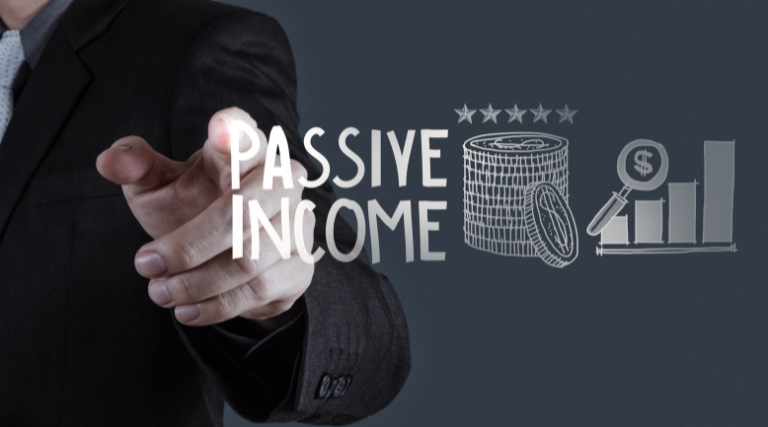The practice of real estate investment, whether it be land or a structure, is very common among people with extra cash. An asset that aids in portfolio expansion, diversification, and estate planning is real estate. Additionally, owning a property is a basic requirement for which you must save money. By making smart real estate investments, you can benefit from possessing property beyond just a place to live.
When combined with your primary income, this income increases your earnings. You may save more money towards your financial objectives thanks to the higher income, and you won’t have to worry about running out of money in an emergency. I have learned from the recent pandemic how important it is to have multiple sources of income. Having a passive income can be beneficial if you lose your job or go through a difficult time with your business.
Let’s first examine what passive income is and how it might be generated through real estate.
Passive Income: What Is It?
Simply said, passive income is money you make while putting in little to no effort. The interest you receive on your bank savings account is a typical illustration. You are not working for the money. Simply keep a balance in the savings account to receive interest from the bank. Thus, this interest money becomes your passive source of income.
Purchasing stock in a partnership company is another illustration. The interest you make in your capital investment is your passive income because you are not actively working in the company.
Benefits of Real Estate Investing for Passive Income
Property investing enables you to generate passive income. There are many advantages to this type of income.
Risk Attenuation

The asset class of real estate is distinct and unrelated to either equity or debt. This means that the risks connected to stock or debt instruments are not relevant to real estate. As a result, real estate can assist you if you wish to diversify your portfolio to reduce your risk. Real estate typically gains over time and would provide you with profits even when your equity or debt investments might not. As a result, you can reduce your exposure to equity and loan risks.
Making Cash While You Sleep
Real estate buyers can earn money without working if they invest in real estate. You can make money even while you’re asleep because your investments are working. For instance, you don’t have to labor for the rent when you rent out your property. You just rented your house, and the rental income began to flow.
Benefit from Opportunity

When you need money, you can use real estate as a leveraged asset. For instance, you may use a loan against property to mortgage your property and receive money based on its value. Then, you can utilize them to finance your company or make property investments in other profitable investment opportunities to earn handsome returns.
Security
A sense of security and an asset is created when you invest in real estate. When money is needed, you can sell the investment and raise it. Additionally, any real estate-related passive income gives you more financial stability in case of emergencies.
Ideas for Investing in Real Estate to Generate Passive Income
Here are the top seven suggestions for creating a passive income from real estate now that you are aware of the advantages:
Rental Earnings

This is by far the simplest and most popular way to use real estate to produce passive income. The rental revenue you receive from a property you own and rent out is included in this category. You can obtain a consistent rental income by renting out both residential and business space.
Pros
- A consistent source of revenue
- Real Estate Appreciation
- Your ownership of the asset is maintained.
- The home still qualifies as a mortgage that you can utilize to raise money.
Cons
- Rent is lost if the property is unoccupied.
- Possibility of property damage when tenants utilize it
- Managing tenants can be difficult.
REITs
Real Estate Investment Trusts are referred to as REITs. These are businesses that were founded specifically to combine property investments from various investors. The combined investment is then put towards real estate with an earning potential. As with mutual funds, REITs operate. The property is not physically yours. You merely invest the trust, and it makes real estate investments on your behalf.
They trade in real estate, making money each time they do so. Even leasing is done by REITs on behalf of the investors. They then pay out dividends to investors in the form of rental revenue or gains from selling real estate.
REITs also have benefits and drawbacks, which are highlighted below:
Pros
- Your investment yields a consistent source of income.
- Since REITs are traded on the secondary market, you can buy and sell them whenever you choose. When you own real estate, this increases your available cash.
- Safeguards against inflation
- Reduced portfolio volatility
- You can own a portion of a diverse real estate portfolio.
Cons
- You must pay taxes on the dividends you get.
- They are vulnerable to hazards related to the market.
- There are no prospects for leveraging.
- The growth outlook is dim.
- You are not the owner of any real estate.
Divulging Assets
Purchasing a portion of a piece of real estate is known as investing in fractional assets. Multiple investors can invest in high-end properties including factories, storage facilities, apartment buildings, etc. The property is subsequently divided among the real estate buyers according to their investment shares, with each owner owning a portion of the asset.
The way to invest in pricey real estate without needing a sizable sum of money is through fractional asset management. For instance, you might be able to invest as little as $5,000 in fractional assets. It is pertinent for novice investors who have little money available yet want to participate in real estate.
The following are both benefits and drawbacks of investing in fractional assets:
Pros
- Real estate investing is possible without having to spend a lot of money.
- You can obtain enticing results.
- You can have access to upscale properties that could bring in a lot of money.
Cons
- Restricted accessibility
- The property does not become yours.
- Opportunity leveraging is constrained.
Property Crowdfunding
Real estate crowdfunding is a way to invest in a portion of a real estate asset, similar to owning fractional assets. In this scenario, numerous investors combine their funds to fund a single real estate venture.
Online sites where a real estate deal is listed are typically used for real estate crowdfunding. With only a few clicks, you can then apply the deal and invest in your choice. The platform is in charge of investment management.
For investors, real estate crowdfunding provides the advantages and disadvantages listed below:
Pros
- You don’t need to invest much to own real estate.
- The income potential is good.
- Online investing is practical.
- You can profit from a sensible real estate investment that might not be within your means otherwise.
Cons
- Limited chance of leveraging
- Limited options and availability
- Along with other investors, you co-own the property.
- Narrow liquidity
Property Mutual Funds

Mutual funds that engage in real estate typically do so through REITs. These funds combine money from several investors and distribute the corpus to various property investing strategies. The fund portfolio is improved and you receive returns thanks to the rental income from the investment. Additionally, purchasing and selling real estate assets or REITs results in capital profits that are dispersed to investors.
The following advantages and disadvantages of real estate mutual funds:
Pros
- Expert fund management by knowledgeable fund managers
- A ready-made portfolio of the top real estate investments is available.
- the likelihood of lucrative returns
- There is a modest investment needed.
- Highly liquid since you can always redeem your mutual fund investment.
Cons
- You must pay taxes on the income you receive.
- Limited possibility for leverage
- No actual possession of any property
Property Flipping
Flipping houses is similar to trading in real estate. With this strategy, you buy and sell properties to generate profits. For instance, you might purchase a house, remodel or upgrade it, and then sell it for more money, making a profit on the entire deal.
Because real estate is not purchased to hold it, house flipping differs from renting a home. You purchase the rental property to quickly sell it for a profit. Flipping hence necessitates extensive market knowledge and understanding.
Pros
- You can generate attractive returns quickly.
- Do not keep your investment locked up for a long time.
Cons
- Requires in-depth market knowledge and understanding.
- There is a chance that you won’t discover a potential buyer.
- Not applicable in a down market.
Business Leasing

Commercial leasing is the practice of purchasing real estate for use by businesses and leasing it to them. Commercial leasing is profitable because it provides significant rental income for a fixed, guaranteed amount of time. The following are the benefits and drawbacks of passive commercial real estate investing:
Pros
- A high likelihood of rental revenue
- Over the term of the lease, the income is fixed.
- Since the property is occupied through the lease, there is no possibility of vacancy.
Cons
- Expensive in capital
- Incurs hefty maintenance and upkeep costs.
- Throughout the lease, capital is committed.
Conclusion
Real estate investments can generate passive income, which is a fantastic method to increase your income without having to work hard for it. Choose one of the aforementioned passive real estate investment strategies, and then use your funds wisely.
